By Mark Heckey
The year 1974 was a watershed time in my life. I turned 22, graduated from college and broke up with my girlfriend. I also lived the life of a vagabundo in Mexico.
Other noteworthy events rose on historical tides. In 1974, Richard Nixon resigned as the President of the United States. An OPEC embargo caused rising gas prices, rationing and long lines at gas stations. The Federal Reserve instituted an austerity program of high interest rates that lead to a major recession. The World Trade Center opened for business. These events mirrored life today.
As jobs were not in abundance, my best friend, Doug, and I began to talk of traveling. We had hitch-hiked California’s Pacific Coast Highway earlier in the summer. Now, we set our sights higher, a major trip to a foreign country. The Viet Nam War wound down under the thundering voice of protestors. We had escaped the draft with lower numbers in the 1973 lottery. No jobs and no draft meant travel. Travel, excitement, and adventure lay ahead of us. Where to go? How about Mexico?
“Hey Norsk, what’s up?” Doug strode up to me as I cleaned my white 1962 Dodge Lancer.
“Do you still want to do the trip?”
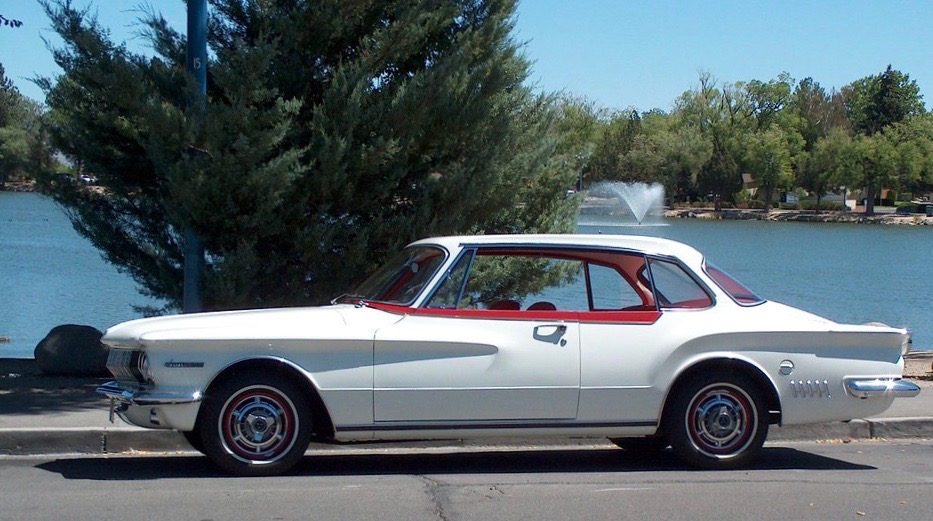
I wondered if we would really do it, cut out with our savings and hit the road to Mexico. I pulled my shoulder length blonde hair into a ponytail, tying it with a rubber band.
“You bet. It will be great. We head south on the Baja, down to Rosarita. We can visit my ex in laws. From there we go south, the Baja Highway is seven hundred miles long. We can explore the Sea of Cortez. It’s supposed to be absolutely beautiful.”
Doug pushed the shock of black hair from his forehead. Dark sideburns framed his clean-shaven face The corners of his eyes scrunched with his catching smile.
“Sounds great. Do you think we can make it the whole way? Gas should be cheaper in Mexico. If we crash on the beach a few times, we can save our bread for food and beer.”
I finished wiping down the windows of the Lancer. The Lancer had a wedge like hood and the side panels had horizontal scoops that were carved into the body over the wheels. I admired the tapered lines of my blocky road rocket.
“You tell me. Can the White Flash hold up? Things are coming apart in your interior, the stuffing is coming out of the upholstery. Your window handle is on the floor. Kinda banged up.”
Doug liked to give me crap about my car.“She has some cosmetic problems but her slant 6 is holding together. Uses little oil. The Dodge Lancer is one of the most reliable cars out there.”
I had been driving the car for three years without any major break downs. I used to call it the White Flash; but now I had another idea.
“I’m changing it to Spanish. From now on its Relumbra Blanco!”
Doug’s eyes narrowed again with his infectious laugh.
***
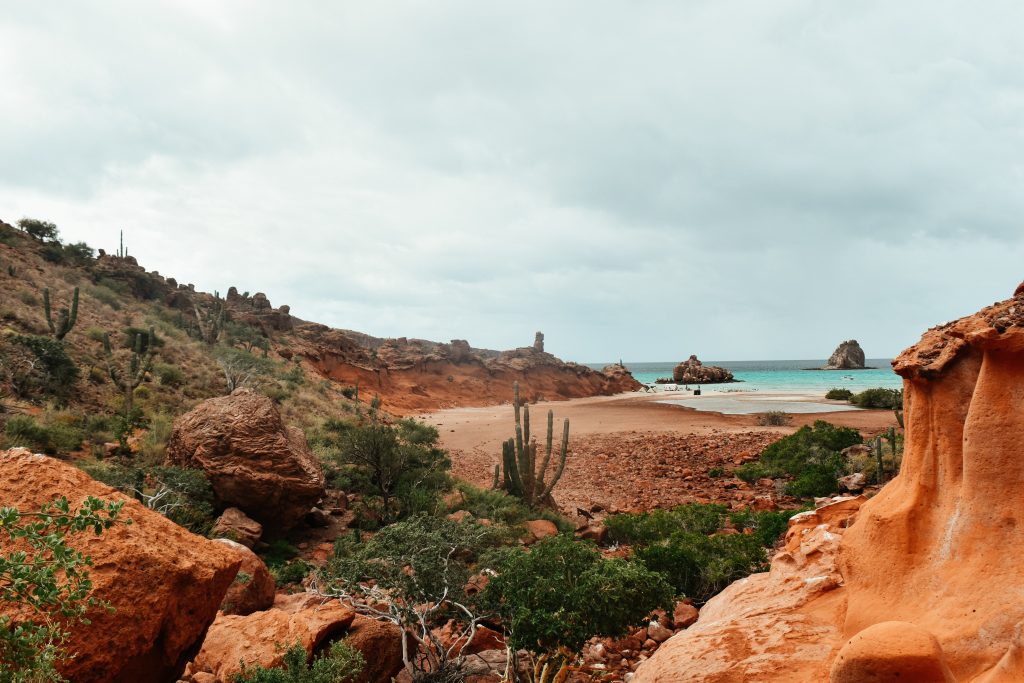
The visit with Doug’s in laws at an ex pat mobile home park near Rosarita Beach set us up for a launch into the Baja. We were rested and ready to explore the desert peninsula. Mexico’s Highway 1 carves a route between golden brown hills and tall chaparral. The highway starts on the westerly coast and about halfway to La Paz, it shifts across to the eastern coast with the beach towns along the Sea of Cortez, also known as the Gulf of California. Small villages adjoin the highway, spread about 50 miles apart
On the evening of our second night out, we encountered a horse standing in the middle of the highway. We managed to brake and move around it. We realized we were in an unfamiliar environment, one where many things taken for granted would no longer be true. The rules of the Baja were unlike Southern California. We were dealing with a vastly different land, language, and culture.
Late in the night, we approached a small village which had buildings on both sides of Highway 1. We slowed to about twenty-five miles per hour and followed the road as it narrowed into a lane lined by stores and restaurants. We were tired and strained to read the road signs in Spanish. Doug had taken three years of Spanish in high school and had a sense of our direction. We heard a low siren behind us and realized a police vehicle was pulling us over. Two local police officers approached us.
“What is wrong officer? Why are you stopping me?” I tried to look as respectful as possible.
“Senor, you ran the stop sign,” said one of the police officers.
I looked behind me at the intersection. I could not see a sign of any kind in the sidewalk or on the light pole. “What stop sign? I don’t see a stop sign.”
“The sign is painted on the store wall. Alto. You must stop. This is a problem.” The officer spoke with a thick accent but had more English than I had Spanish.
“You must pay a fee. You can pay the ticket now, with us.” The second officer informed us of an expedited method for dealing with traffic tickets.
I looked at Doug. He raised his eyebrows. We couldn’t believe we needed to pay him right now. We were flabbergasted.
“How much is the ticket?” I asked.
“Fifty American dollars.” The first officer replied.
“We don’t have fifty dollars. We have ten.” Dough interjected into the conversation. He started to barter.
The officers moved away from the car and began to speak in Spanish. “Senors, we must talk El Capitan. We will bring him.”
We sat quietly for about fifteen minutes. A man in plain clothes pulled up in an unmarked car. He walked over and looked at us. He flashed a light into our back seat, illuminating a car filled with an ice chest, slipping bags, and food wrappers. He looked our driver’s license and shook his head. He began to speak Spanish to the police officers and they let us go.
El Capitan waived us towards the highway. “Adios, amigos,” he smiled. We returned to our late-night search for the next beach campsite.
“That was close Norsk. We could have spent the night in jail.” Doug sighed with relief.
“Do you think they get all the tourists? I guess it’s a good thing we look like bums.” I turned on the radio and tuned in a station with a peppy Mexican polka. A good song for a couple of lucky vagabonds.
***
A few days later, we arrived on the section of Highway 1 that accesses the east coastal towns. We slept and camped on the beaches. No one bothered or asked any questions. Informal camping seemed to be sanctioned and permissible. We found a beautiful area with a remote white sand beach. The bay shimmered with turquoise water. A stream flowed into the beach through rocky outcroppings. After breakfast at our campsite, we climbed the rocks to point where we took in the sweeping shoreline views. A series of small water pools stair stepped down the white rocks. We swam and lay in the sun. In the afternoon, we went into the bay and snorkeled. Multicolor fish paraded down a white reef. I felt a large shadow move across the water. I turned to see a Sting Ray ripple through the water about fifty yards away. I could see the barbs on the tail and my heart began to pound with excitement and wonder. I felt an electricity flowing across my skin. Life displayed itself on the blue canvass of the Sea of Cortez. The beach remained deserted the entire day. We ruled a magic kingdom. The vagabond life cast a spell and we were mesmerized.
***
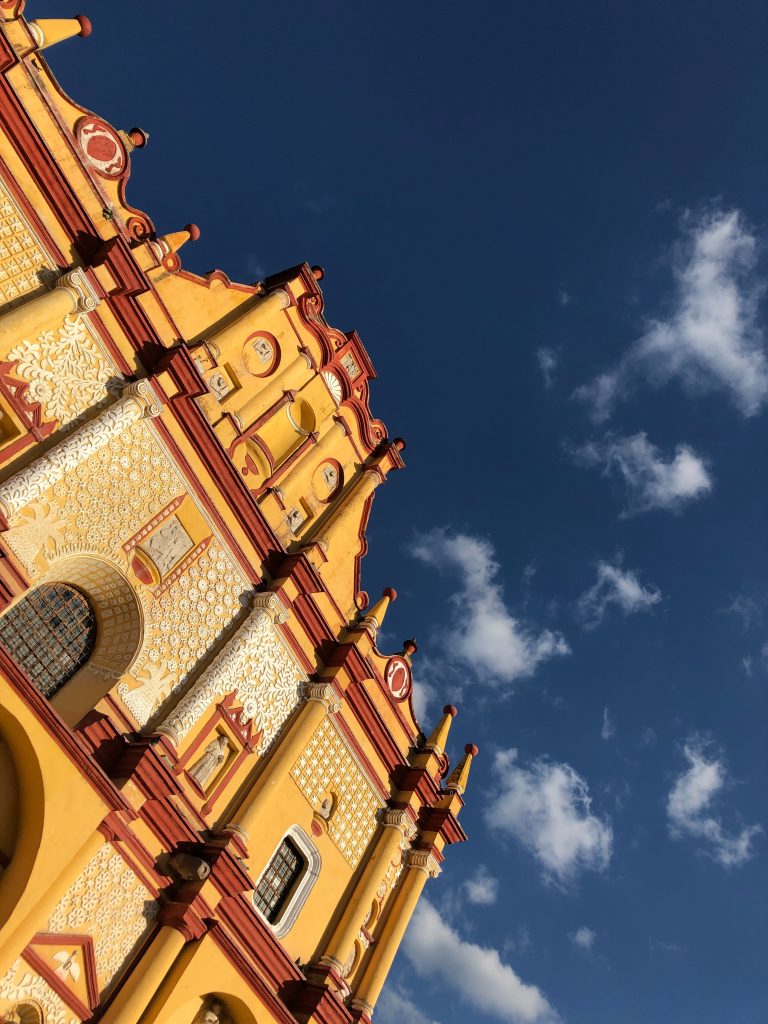
After a week of beachcombing and camping, we approached La Paz. We had traveled 500 miles on Highway One. We needed to make a major decision; one we had scarcely discussed since leaving Riverside. La Paz offers a ferry service to the Mexican mainland. The ferry accommodates autos. It only runs three days per week, providing a thirteen-hour overnight trip to Mazatlán. We could try to reach Cabo San Lucas at the southern tip of the Baja. This would risk missing the ferry and delaying the mainland for three days. We decided the extra delay was not worth it.
In 1974, La Paz was a thriving port city of 600,000 people. This was the first major city we had seen since entering Mexico. The city pulsed with activity. As restaurants were more expensive, we continued our habit of patronizing street vendors and community markets. The ferry would leave at 3 p.m. We walked the wharf and docks in the late afternoon. As we purchased our ferry ticket, we noticed three young women who were attractive and well dressed. Doug was the smooth talker, and he made the first approach. Doug spoke Spanish and his new tan from the beach life made him look Mexican.
“Excuse, me, can you tell us where the ferry drops us off? We are thinking of going over to Puerta Vallarta. Is it far from Mazatlán?” Doug spoke in a good version of Spanglish.
“Oh, it is not far from Mazatlán to Puerto Vallarta. About four hundred kilometers. Six hours to drive.” One of the young ladies answered in perfect English. She smiled and direct eye contact.
Doug felt an invitation to talk. “Where are you from? Do you live in Mazatlán?”
A second girl turned to answer, “Oh no, we are university students. We just came from Cabo. We are on holiday. It’s Independence Day. We went to a party.” She too spoke perfect English.
Not good at small talk, I tried to get involved in the conversation. “Where do you go to school? I just finished U.C. Riverside.” They were underwhelmed by my comment.
“University of Guadalajara!” The girls all named their school in sync. They laughed nervously. “We are second year students.”
We kept up a lively banter as the call to board was announced. We pulled the White Flash into the auto cue for the crew to secure on board. We walked the lovely co-eds up the boarding ramp, and we settled together in a table near the window. We ordered drinks and comfortable silence settled on the five of us as we watched the skyline of La Paz slowly disappear in the west. The hours began to slip by as the ferry jugged to the east. We learned that the girls were from different parts of Mexico, that they were roommates, and enjoyed practicing their English. Doug and I could not believe our good fortune. We had three beautiful companions and our first friends in Mexico, three amigas.
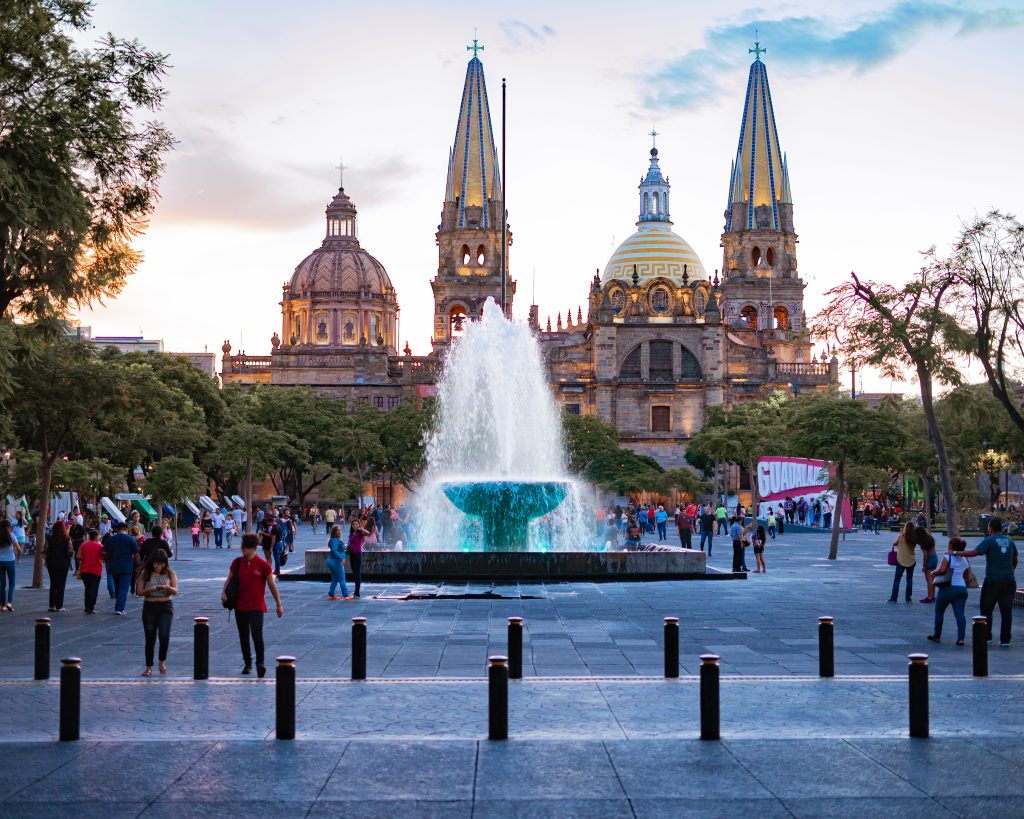
Since the trip was overnight, passengers slept in couches and chairs in the lounge or in deck chairs on the veranda. We shared stories of our travels with Veronica, Madeline, and Constantina. They told us about Guadalajara, a city they were proud of. Veronica asked if we were on holidays. Veroncia was surprised that we had no schedule and no work or school to return to. Since it was Independence Day, we talked about the 4th of July celebrations back home. We began to compare national holidays.
“Do you have a Thanksgiving?” I foolishly asked.
“No, that is only the U.S. That is your turkey day, right?” she said.
“Yes, but it is big day. We have a big festival. A big meal. Lots of family.”
“You will miss it this year?”
“Yes, if we keep traveling, we might. We hope to go to Arizona and Nevada, after Mexico.”
“You must visit us. We can cook a turkey for you. Please come to Guadalajara. We will have your Thanksgiving!” She wrote out her name, address, and phone number on note paper. She extended the invitation to me.
I handled the note like a precious formal dinner invitation. I folded it neatly and placed it deep inside my Levi pants pocket. “Thank you. That would be great. We would love to visit you!”
Around midnight everyone slowed down, nestling into places to grab some sleep. The girls huddled under a blanket on one of the upholstered couches. Doug and I walked outside, took in the crisp night air. We opened our last beer from the bar and sat down on a deck chair.
“Doug, this trip is amazing. I can’t believe we met those senoritas. They want us to come to Guadalajara.”
“Well done, Norskie. Way to use your Scandinavian charms. Here’s to Guadalajara!” He tapped my bottle of Corona with a crisp, harmonious clink.
***
When we disembarked the ferry, we were surprised to extensive building and development on the shoreline. These were the days prior to Mazatlán’s current connection with El Chapo and the Sinaloa cartel. We were safe at night to roam the commercial areas. Condominium construction dominated the beachfront.
We were further disappointed when Madeline’s boyfriend showed up to give them a ride to Guadalajara. We thanked them for their company and promised to make our way to Guadalajara to visit them soon. After retrieving the Relumbra Blanco, we parked and walked the commercial district. American tourists and expats crowded the streets and restaurants.
“You know what they call Mazatlán?” Doug asked. I shrugged with no answer. “Long Beach with an accent. This reminds me of Southern California.”
We found an expensive hotel and a pricy dinner that night. Mazatlán did not welcome vagabundos. We felt the need to move on.
“Let’s head down to Puerta Vallarta. I heard it’s only a fishing village. I think we will fit in better there.” We were eager to leave the over hyped tourist area.
***
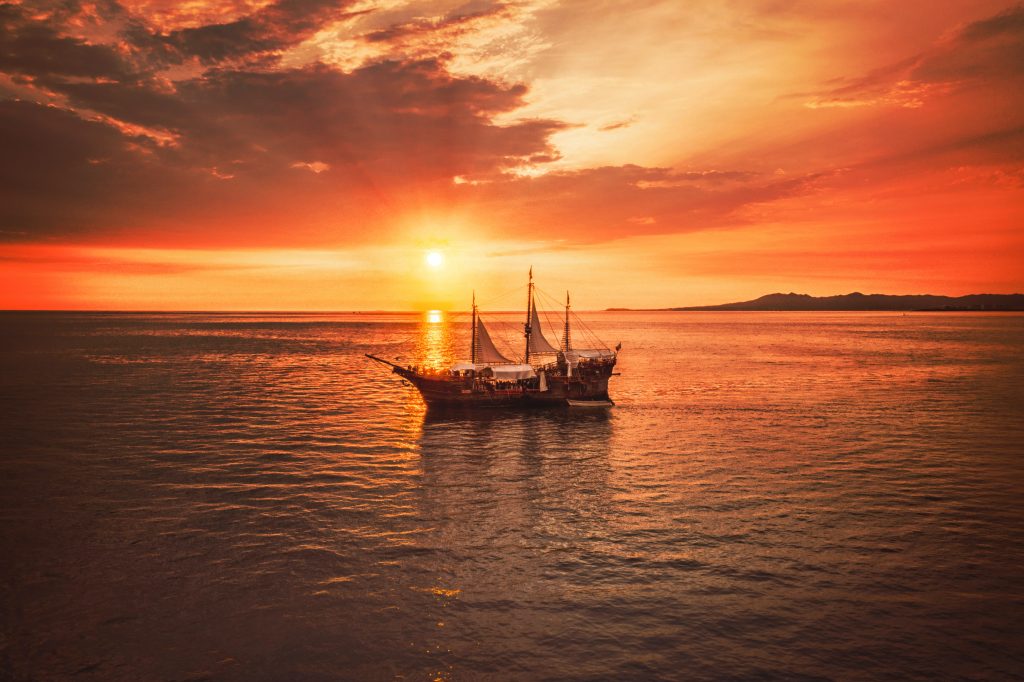
Tourism had not yet exploded on Puerta Vallarta. The population sign displayed 30,000. Fishing boats, not condos, dominated its harbor. We instantly felt more comfortable and accepted. People smiled and occasionally waived at our other hippie travelers. The surrounding land had more vegetation, a verdant green thickness just off the village streets. When we arrived, the central plaza reverberated with a festival featuring mariachis and dancers. Song and dance filled the night.
After two days of revelry, we were ready to make the push to Guadalajara. The road trip lasted approximately five hours. The Flash continued to be reliable, and the Slant 6 engine powered through the coastal mountains. We drove straight through with only one rest stop.
Guadalajara is a beautiful metropolis built in the colonial era style with red tiled roofs and whitewashed plaster dominating the cityscape. On the horizon, a huge cathedral with twin gold spires loomed over the downtown skyline. The city sprawled before us with a network of small intertwining streets and lanes. Hopelessly lost, we stopped and bought a map from a local mercado. Everywhere we looked were plazas, squares, and monuments. We finally identified the University and the neighborhood where our amigas lived. Soon we walked through the iron gate of their walled apartment complex. We were greeted warmly by Constatina. Hugs were exchanged and the girls served chips and salsa. We could spend the night and sleep on the floor.
Around ten p.m., Madeline received a phone call. We could hear her talking over the kitchen phone. Her voice became distressed. The muffled voice sounded agitated. She began to look very anxious and concerned. Her voice began to break with emotion. She hung up and returned to the living area, her face strained with emotion. She rattled off to her roommates in an agitated, rapid-fire Spanish. We had no concept of what was being discussed but we kept hearing the word “pistola” repeated several times.
Veronica approached us. “I am sorry. You must go! Now! Enrique is a very jealous boyfriend. He is upset you guys are staying here. Please leave. He has a pistola!”
“Did you say pistola? A pistol? A gun?” The word stuck in my throat. I motioned to Doug. “Let’s vamoose. Grab your stuff!”
Fortunately, the White Flash started up, I hit the push button transmission keys so hard a button fell off. We were out of there in 60 seconds. Our adventure in Guadalajara had evaporated in the angry words of a jealous lover. On the road again!
***
Our fortunes had momentarily derailed, but we knew that we needed to put distance between us and Enrique. We headed back to the coast intent on putting miles between us and the dangerous boyfriend.
This was not the end of our troubles. As we headed north on the mainland coastline, a big tropical storm emerged above us. The storm pelted us with a hard driving rain. In 1974, Mexico experienced an unusual array of hurricanes and tropical cyclones. The windshield wipers could not keep pace with deluge of water. We pulled off on the side of the highway and hunkered down. The hammer strokes of the downpour on the roof of the car kept us awake most of the night. The next morning, we drove into a town that had been hit hard. Storm debris covered the streets. Tall palm trees leaned over on roof tops. Cars were half submerged in roadside ditches. Road signs had been snapped off by high winds. We decided that maybe the Fates were trying to tell us something. We agreed it was time to head back to the U.S. Our destination would be Doug’s friend in Phoenix. We would seek safe harbor there.
We approached the border 24 hours later. A regiment of the Mexican guard patrolled the border crossing at Nogales. We cued up with the line of vehicles seeking to cross. Foot soldiers in olive fatigues walked up in down the line of cars. Machine guns hung from their shoulders. We had never experienced such an ominous inspection. We were told to open our trunk. We obliged. The guards waived us through.
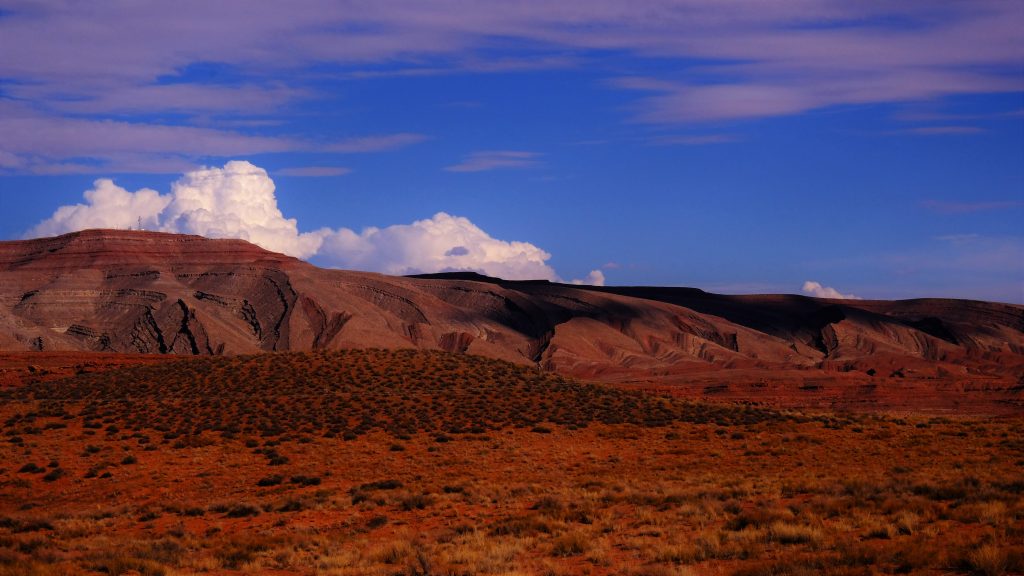
In Phoenix, we recovered by staying with Doug’s friend from high school, Rick. He entertained us for about a week in his apartment. He worked during the day and trained as a figure skater at night. He had high hopes of making it big someday. It seemed an odd place to train for a sport on ice. We could tell our welcome began to wear thin when he asked for grocery money and rent. After a few nights of bar hopping, we loaded up and headed for Las Vegas, our last hurrah before returning to Riverside.
We drove for hours and arrived in Las Vegas around sunset. The flashing hypnotic lights of the strip beckoned. Mesmerized we stopped at a smaller casino at the edge of the city. We walked into another world, hypnotized gamblers staring at slot machines and sweating under casino lights. This new world flashed, blinked and shouted at us. We began to feel small, shrinking back from the manic intensity of gambling and drinking. After a month on the road, we were down to our last $40. After watching quarters get slurped up by a row of one arm bandits, we took another look at our plans. We needed to cut our losses, get home as soon as possible.
We headed back late that night. We were quiet as we sped through the deep purple of the desert night. The clear November sky blazed with a speckled array of star light. We had the highway to ourselves, and we fell into a deep mutual silence. People and places rolled through our consciousness. Home. Heading home.
“Well, I guess we will get that Thanksgiving dinner, but not in Mexico.” Doug broke the silent understanding that filled the White Flash.
“I’m ready. I’ve got to admit it, I miss Riverside. I miss my family. Time to head back,” I said. I reached out and patted Doug on the back. “It’s been quite a trip. An adventure really.”
“I guess our vagabundo days are over. I don’t know how we stretched our money so long. We were sure to run out soon. We have just enough for our last gas stop in Barstow. I am ready to spend a night in my old room at my parent’s house.” Doug leaned back in his passenger seat, staring up at a full moon.
“I am going to find a job when we get back.”
The moon light stretched across the flat brown desert ground. The headlights pulled the black asphalt beneath the wheels and sent the road behind us, to the southeast, towards the route from Vegas, Arizona, and Mexico. The highway stretched forward, pushing us to home.

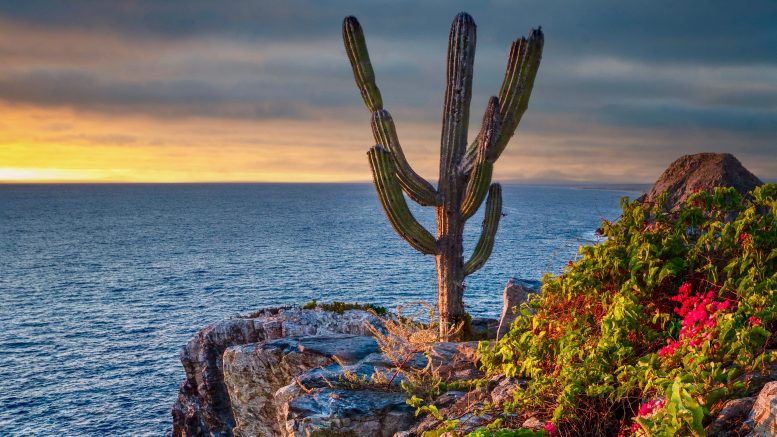
Be the first to comment on "A local writer remembers ‘Relumbra Blanco,’ or travels through Baja, Mexico"